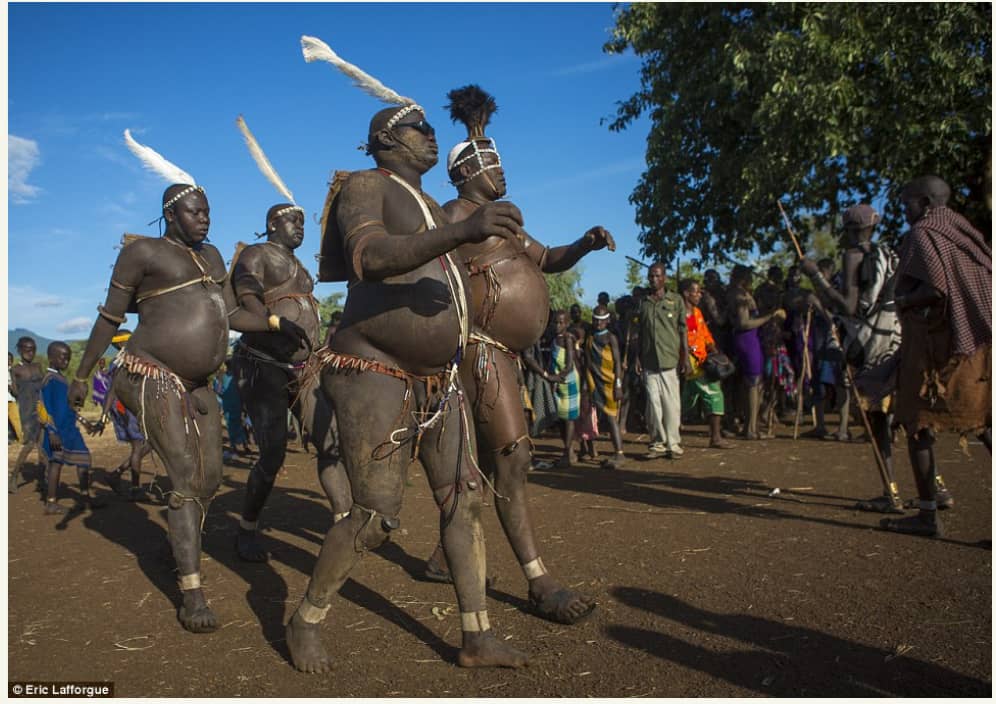Beauty they say is in the eyes of the beholder, as you can see in the Ka’el cultural practice of the Bodi tribe. Where big, firm and thick body is the order of the day. An attribute that qualifies the winner as a pride of the Bodi tribe and a hero for life.
The Bodi tribe is in a remote area near the Omo valley in Southern Ethiopia. They deal in Livestock and Agriculture. They are one of the ethnic tribes in Ethiopia that have refused to accept the modern way of life.

They still engage in trade by barter. For them to get to the weekly market to exchange things, they will have to walk for hours. A wealthy Bodi man is self sufficient, he owns his own livestock. Cows is equal to money. Having a big body is a sign of wealth and connections. They don’t rely on much beyond their own tribe.
The Ka’el ceremony is a ritual held to mark the starting of the new year which is in June according to the Gregorian calendar. A group of unmarried Bodi men enter into a competition for Ka’el ceremony. Each family is required to bring a representative to take part in this competition. They are to live in isolation in a hut where they are not allowed to have sex or leave the hut. They are placed on a special diet of a mixture of fresh milk, butter and blood from cow only for a period of six months. Unmarried ladies are responsible for serving them with the concoction each morning in a calabash. The men are required to drink the concoction as fast as possible before it coagulates due to the temperature of the area. Some of them cannot handle drinking so fast, so the vomit. To get the blood from the cows, a hole is made in a vein with a spear or an axe, and after that, they will close it up with a clay. The cows are sacred to the Bodi people, so they do not kill them. Some of the competitors don’t have their own cows, they are supported by their families, friends or sponsors who donate their cow milk to them. When the ritual is completed, the competitors cover their naked bodies in clay and ashes before emerging from the huts. On the day of the ceremony, The competitors dance around the village showing their new engorged physiques. Some of them are so big that they cannot walk any more. Villagers watch from afar, including women seeking potential future husband.

For a winner to emerge, the decision is based on the new physique of the competitors which has to be big body and butt that is firm, thick and feels like a rock. Preferably bloated and firm not shaking. They are lined up and grouped based on fattest. They skinny ones who were not committed will be paired together. The winner will be seen as a pride of the tribe and a hero for life. Elders will respect him, neighbours will gossip, and every unmarried lady will wish to be his bride.
After the annual celebration, the men go back to their normal lifestyle, eating sparingly so as to lose all the weight the gained but he will still be seen as a hero for life. A few weeks later, the next group of competitors will be chosen for a new competition.
Every Bodi kid dreams of becoming a fat man, so as to be seen as a hero for life. Participating in the competition is a way to attract potential wives. Men here believe that the bigger they are, the more women will desire them.
The Bodi tribe are so proud of their culture and do not care about what outside world thinks. They wish to carry on as their ancestors did. Due to the fact that the tribe have proven to be the biggest bodies in the Omo valley, they were given the nickname the “Bodi”, hardly anyone calls them by their original name “Me’en tribe” any more. They have embraced the name and kept celebrating their bodies in the annual Ka’el ceremony.

The competitors spend hours walking in circles around the village sacred tree, strictly watched by judges while the women help them with water and alcohol and also wipe away sweat.
The ceremony ends with the killing of a cow using a huge sacred stone and the blood is inspected by the village elders to see what the future holds for them.






You must be logged in to post a comment.